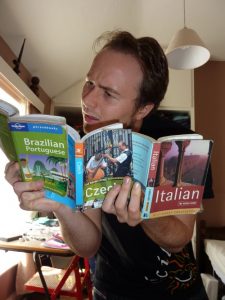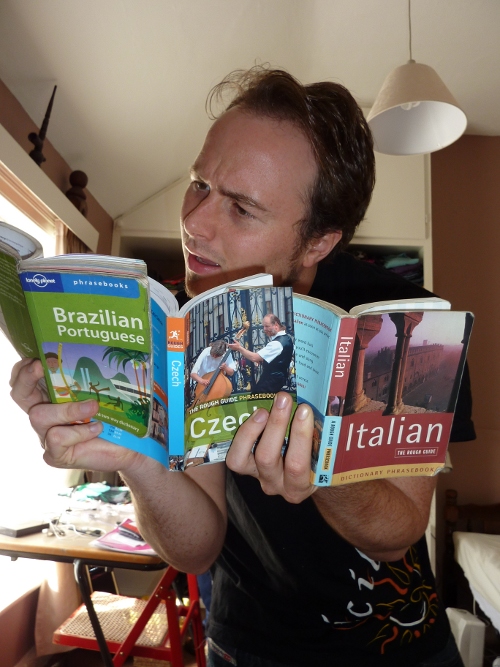Travel phrasebooks: a serious language learner’s best first book to study

Please note: this article was written in June 2009.
Those who know me, are aware that I can actually take a lot with me on cheap flights, but I still have to decide what is and what isn't coming with me for my next 6 months on the road! (Czech Republic, then likely somewhere in South America again)
I haven't had the time to sit down and study any Czech this week because of work, but that just means that my 3 month learning period really will be almost entirely in Prague. Apart from the flick through the grammar book mentioned in my previous post, I haven't done anything!
For most people, this may be a very poor start to someone planning to become fluent, but there is still plenty of time! In fact, language studies really will be part-time for me for the entire 3 months since I will be working full time, so I'm starting my study rhythm as I intend to continue 😉
I bet some of you were thinking that I'd get fluent by studying all day every day for my whole visit? Not quite! You can achieve a lot, even in part-time studies, as I'll be showing you 🙂 However, tomorrow I'll have a 2 hour bus ride to Dublin, 2 hours waiting in the airport and a 2 and a half hour flight. That is a LOT of time and it will be the most important in my entire Czech studies as I learn as much of the crucial basics as possible from my Czech phrasebook.
These books may be geared towards tourists in a hurry to get through a city who have to “put up with” being forced to speak the language when outside of their main touristy zones… but I swear by them to start learning a language when your end-goal is fluency. Grammar should be taken in very small doses when you are starting up, and these books avoid grammar almost entirely!
You can learn the essential phrases as one block each (not necessarily understanding individual words) and you will get your point across. Thanks to phonetics under the phrase, you don't even have to get your head around the new spelling and pronunciation system yet! The priority in learning a language should always be on communication and not on intensively studying each part of the language to perfection and then going on to the next one.
A phrasebook is also fun and practical to read! Here's why:
- You can get through it very quickly, and feel a great sense of achievement for the amount that you are able to say if you memorize it well enough
- It covers all the basic conversation categories you want to know when starting off and some even give slang and go more into depth for other situations (I find Lonely Planet's chatting-up pages in their phrasebooks especially funny)
- The dictionary at the back is very handy. It gathers the most frequent and useful 500 or so words; it is big enough to give you most of what you need in general situations, but small enough to actually study! While waiting for a bus, get through all of the letter A… when in the queue at the supermarket learn 3 new words etc. It's impossible (or at least crazy) to study an actual dictionary, but dictionaries at the back of phrasebooks have been my key to getting the most important vocabulary quickly.
- They are small enough to fit in your pocket. In the lift? Swoop it out, and learn one new word or phrase before the doors open and then back in your pocket it goes! All of these pieces of time add up quickly! See what I mean by part-time? 😉
- When you have gone through it enough, you will definitely have at least a somewhat basic overview of what the language looks like, and this makes the more serious studies ahead a lot easier. You'll see words and phrases you recognize from the phrasebook when studying the grammar book, and this familiarity really makes a big difference in making it more interesting. I'm not suggesting that a phrasebook replaces standard study; there is only so far you can go with these tiny pocket books! But for starting off, they really are excellent!
You can get them for many languages, and from several companies; Lonely Planet do them (note: I don't mean the phrases at the back of the city/country guidebook), The Rough Guide, Berlitz and several others. Usually I prefer Lonely Planet because of their wide range of topics covered by the phrases, but all of them have their own benefits. And best of all? They are CHEAP!! The brand new Czech phrasebook you see in the photo only costed me €6. You can get them in most big bookshops, on amazon and of course at the airport.
I wish these companies were paying me commission to advertise them so passionately today 😛 Have I convinced you? Any thoughts on your own best first type of book, or experience with phrasebooks, or advantages I forgot to list? Share them in the comments below!
Interested in more clever tricks? Check out Fluent in 3 Months Premium – the essential guide to speak another language fluently in the shortest possible time.



Social